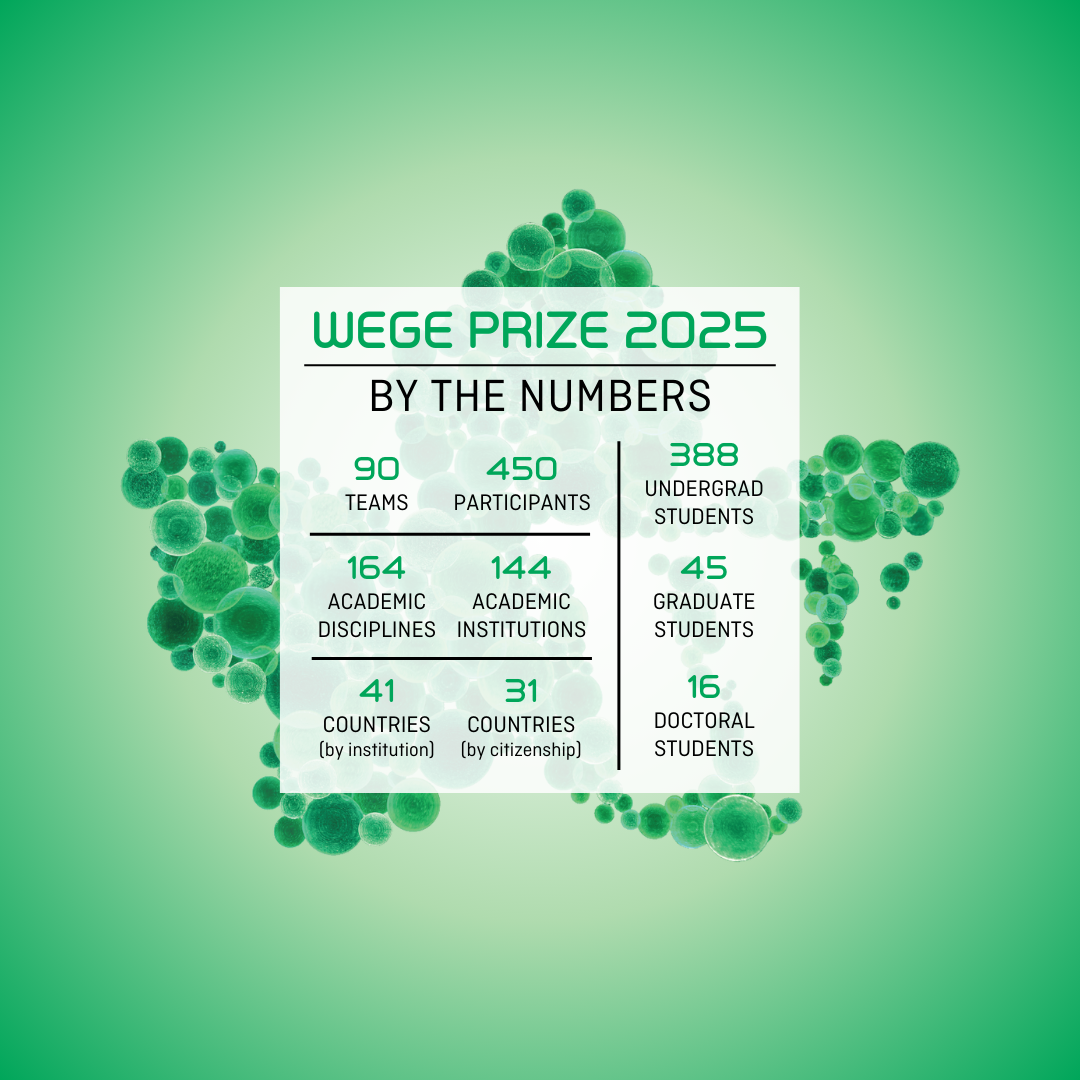90 student teams move on to Phase 1 Preliminary Judging.
These 450 participants come from 144 academic institutions in 41 countries around the world.
Grand Rapids, Mich., October 16, 2024 – This year, a precedent-setting applicant group of 130 five-person teams worldwide were narrowed down to 90 teams for Phase 1, the largest pool of participants in Wege Prize’s 12-year history, to compete in the international student competition for circular innovation. In all, the 90 collaborating teams represent 450 students hailing from 31 countries, including 164 academic disciplines from 144 academic institutions in 41 countries. According to Wege Prize lead Gayle DeBruyn, the preliminary judging panel brings together regional, multidisciplinary experts, who will provide valuable feedback and expertise to these teams, advancing a selection of around 30 teams to Phase 2. Newly added to Wege Prize’s expanded, 15-person panel of Preliminary Judges, says DeBruyn, are:
-
Yumiko Jakobcic, Ph.D., Director of Grand Valley State University’s Office of Sustainability Practices
-
Fernando Ramirez, co-founder and designer of Common Object Studio
-
Audrey Whaling, program manager for the Emerging Lansing 2030 District
-
Deborah M. Steketee, Ph.D., Professor Emerita of Sustainable Business at Aquinas College
-
Milinda Ysasi, CEO of Grow, and the City of Grand Rapids’ 2nd ward Commissioner.
Along with the Preliminary Judges, Wege Prize’s global panel of Core Judges round out the competition’s diverse and distinguished experts. This year, the core group is joined by Skot Welch, Principal/Founder of Global Bridgebuilders (GBB), an international firm focusing on organizational development, cultural transformation and inclusion. You can read the full bios of all of the judges on this page.
When the seven-month competition moves into its second phase, Wege Prize’s Core Judges will guide the remaining five-person teams as they work to advance through the four-phase competition by refining their innovative concepts into authentic uses that support the circular economy. The core judges’ subsequent selection of 15 semi-finalist teams in January will be followed by five chosen finalist teams in March, who will present their completed concepts in May, live, for the judging panel as they vie for Wege Prize’s top spot and $30,000 USD. Second and third place teams will earn $20,000 and $10,000, respectively, with each of the two remaining finalist teams receiving $2,500 for their inventive concepts. England-based core judge Jo Williams says the circular economy isn’t about tweaking the linear economy, but about embracing a completely different system where materials and capital are continually circulated:
“What the circular economy offers… is a different way of creating profit,” says Williams. “And in doing so, it also creates a different way or recognizes, that the system we live in is equally important, so we’ve got to look at value in a broader sense.”
To date, more than 1,750 students have participated in Wege Prize, helping promote the circular economy among the multidisciplinary, cultural, and institutional participants, with the competition’s top teams winning more than $435,000 in total cash awards during the past 11 competitions. Many teams have progressed insights gleaned through Wege Prize’s judges though incubator hubs and private business models, furthering real-world solutions to environmental, energy, waste, hunger, agricultural and other challenges.
“The dynamic synergy between Wege Prize’s student teams and the competition’s expert judges creates pathways that move the inventive concepts into workable solutions that support a circular economy,” says Gayle DeBruyn, KCAD professor and Wege Prize organizer. “As more student teams come together for Wege Prize, our larger judging panel ensures that every team’s inventive solution is considered with absolute attention to each aspect of the product or service’s design and how it advances the circular economy, sustainable business operations, and the natural environment.”
For inquiries on press opportunities, interviews, and more, contact Karen M. Shan at karen@ccsullivan.com.

